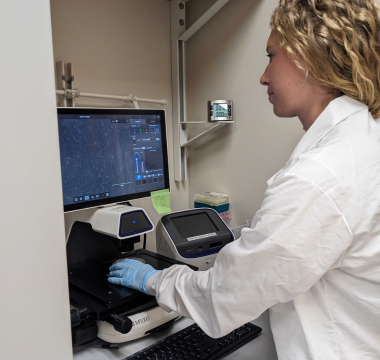My PD Story

Katherine Surridge, PhD
2025 Postdoctoral Fellowship
Understanding the Consequences of Targeting LRRK2’s Different Forms To Improve Future PD Treatments
Genetic studies of Parkinson’s disease (PD) have identified several proteins key to disease risk. One of these proteins is called Leucine-Rich Repeat Kinase 2 (LRRK2), whose job it is to regulate the activity of various cell processes.
Genetic variants of LRRK2 can be found in 1-5% of all PD cases. However, abnormal LRRK2 activity is often seen even in people without a clear genetic link to the disease, making the protein a strong target for designing novel treatments. Katy Surridge, PhD, recipient of a Parkinson’s Foundation Postdoctoral Fellowship, is broadening our understanding of LRRK2’s role in cells to improve PD treatment development.

Like nearly all proteins, LRRK2’s activity is regulated by switching between an “off/open” and an “on/closed” state. The majority of research and treatments are focused on drugs that target LRRK2’s “closed” form, but evidence suggests that the protein’s “open” form may be a better therapeutic target in cells. Understanding how the use of different drugs with different mechanisms of action affects LRRK2’s role in cells is important for understanding both the normal function of the protein, and how best to target it for PD treatment. Dr. Surridge, under the mentorship of Samara Reck-Peterson, PhD, at Weill Cornell Medicine in New York City, has recently created tools that allow her to target and observe both forms of LRRK2 in cells, something that has not been directly studied before.
“My research will use a newly designed toolkit of small molecules to study LRRK2’s endogenous interactome, localization, and the potential cellular consequences of therapeutic LRRK2 inhibition with different drug types” - Dr. Surridge
Using these tools, Dr. Surridge will first explore LRRK2’s interactome – the collection of all the other proteins in the cell that interact with LRRK2. She will compare and contrast which proteins interact with LRRK2 in its open state vs. its closed state, highlighting which processes would be affected during different types of LRRK2 treatments.
Next, Dr. Surridge will analyze the different pattern of modifications (phosphosites) on LRRK2 itself. Evidence suggests that LRRK2 is modified differently in its different forms, and she hopes that by mapping these differences, she will identify novel features which can be used in both diagnostics and the design of new ways to specifically target the protein in future therapies.
Dr. Surridge will then monitor how the protein’s localization within the cell changes depending on form. Previous studies have suggested that certain drugs may affect LRRK2’s localization in cells, and that this could impact other cellular processes. Dr. Surridge therefore expects to find closed-form LRRK2 in different parts of the cell than open-form LRRK2.
These experiments will empower researchers to see and study LRRK2 in completely new ways, unlocking paths to new LRRK2-centered treatments of PD. When asked about how she feels about the fellowship and her upcoming research, Dr. Surridge said “I am delighted to receive this award from the Parkinson’s Foundation, which will help me to address a critical gap in knowledge in the field of LRRK2 cell biology, with potential to inform the future design of novel Parkinson’s disease therapeutics.”
Meet more Parkinson’s researchers! Explore our My PD Stories featuring PD researchers.
Related Materials
More Stories
from the Parkinson's community


